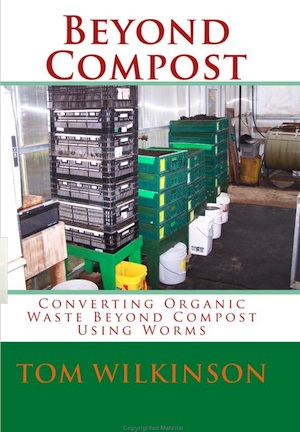Vermicomposting - Troubleshooting
If you create the proper environment for your worms to live in, and supply them with the right amount of food and moist bedding material, you probably won't have any issues.
But worm bin composting is a natural process, and sometimes in nature things get out of balance and problems arise.
Luckily, most issues you might experience with a composting worm bin are easily identified and fixed.
Vermicomposting Troubleshooting - The Worm Bin
Let's take a look at some of the common problems people experience with their worm bins, and what to do about them.
Vermicomposting Troubleshooting - pH Levels:
Without getting into the science of pH levels too much, pH is a measure of acidity and alkalinity, and worms in a compost bin survive in a range of 6.8 to 7.2, with 7 being a neutral pH measurement.
Measuring the pH level inside your worm bin isn't necessary, but you should consider pH levels a problem if you notice a drop in activity and other troubleshooting remedies aren't working.
- Limiting citrus scraps will help prevent the bin from becoming too acidic.
- Adding crushed egg shells will lower the bin's acidity.
- Nitrogen-rich scraps (such as coffee grounds) release ammonia, increasing pH levels. Limiting nitrogen-dense materials can keep this under control.
If you do want to test your worm bin's pH level, pH testing kits are available at garden or hardware stores. Remember: pH of 6.8 to 7.2 for compost worms
Waiter, There's a Bug in My Worm Bin!
If you start to notice an abundance of flying or creepy crawly bugs in and around your worm bin, it's time to make an adjustment.
- Vinegar flies: These little flies (also known as fruit flies) are a sign of exposed food scraps and overfeeding the worms, especially citrus fruit scraps. Reducing the amount of food for a bit, and burying it a bit in the bedding material should solve the problem. Also, make sure your worm bin is always covered.
- Mites: You "mite" see these bugs crawling around in your worm bin. Small numbers of mites is common in worm compost bins, but too many can be a health risk to the worms. Following healthy worm bin procedures should keep mites in check. Beds that are too wet, too much food, and food with too much water in them can all lead to mite overpopulation.
Vermicomposting Troubleshooting - Other Common Worm Bin Problems
Besides bugs, there are other issues that can come up with your worm bin:
- Stinky Odors: a healthy-functioning worm bin shouldn't smell, at least not smell bad. Odors can arise if food scraps are exposed, if the bedding material is too wet, if there's not enough oxygen aeration, or simply if there's too much food for the worms to handle quickly.
- Mold: If you see mold forming on the material in the worm bin, this is a sure sign of too much acidity. Limit citrus scraps and add crushed egg shells to bring acidity down.
- Dry Bedding: Too much dryness can be a sign of excess ventilation. Keep the bin covered, and cover some of the ventilation holes in the bin.
- Water in the worm bin: If you're seeing water pool in your worm bin, there's not enough drainage or ventilation. Make sure food scraps aren't dripping wet, and cut down on adding moisture to the bin until conditions dry out a bit.
- Runaway Worms: Your compost worms shouldn't be making a jailbreak from a healthy worm bin. If you catch worms trying to crawl out and away from your bin, they're not happy about something. That something can be bedding that's too wet or dry, not enough food, not enough aeration, temperatures too hot or cold, or acidic/salty conditions. Adjust accordingly, and worm escapes should decrease.
- Dead Worms: An abundance of dead worms in your worm bin is the ultimate sign that something's not right. Worm bodies are mostly water, so when they die their bodies break down quickly so you usually won't even notice them. If you do notice a lot of dead worms, it's usually for the same reasons listed above for runaway worms. If the die off continues, you'll need to start over: harvest the live worms, throw the bedding and food scraps away, wash the bin thoroughly, and start over with new bedding material and new food scraps.
Interested In More On Composting?
We offer a lot of information on composting and some great composting product reviews. If you really want to get your feet wet in the composting business, be sure to read these additional articles of interest:
Composting 101
Worm Composting
Vermiculture - A Worms Healthy Home
Vermicomposting - Troubleshooting Tips
Compost Pit
Compost Container
Making Compost
Soil Saver Classic Composter Product Review
GeoBin Composting Container Product Review
Worm Factory 360 Product Review
comments powered by Disqus




































































